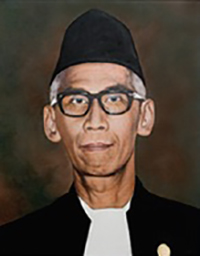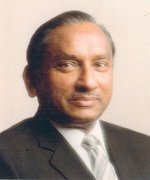
Thirugnana Sampanthar Sinnathuray,known professionally as T. S. Sinnathuray and to his friends as Sam Sinnathuray,was a judge of the High Court of Singapore. Educated at University College London and called to the bar at Lincoln's Inn,he practised for a few years in a law firm before beginning a career with the Singapore Legal Service,serving with the Attorney-General's Chambers as Crown Counsel and deputy public prosecutor (1960–1963),and senior state counsel (1966–1967);with the Subordinate Courts as a magistrate (1956–1959),first district judge (1967–1970),and senior district judge (1971–1978);and with the Supreme Court as deputy registrar and sheriff (1959–1960),and registrar (1963–1966). In 1978 he was elevated to the office of Judge of the High Court of Singapore,and served until his retirement in 1997.

The Presidential Cabinet was the first cabinet established by Indonesia following the 17 August 1945 Indonesian Declaration of Independence. It comprised 20 ministers and four officials. Its term of office ran from 2 September to 14 November 1945.

The Judicial Commission of Indonesia was established as a consequence of the third amendment to the Constitution of Indonesia ratified by the Indonesian People's Consultative Assembly on 9 November 2001. The Commission's duty is to monitor the performance of judges,advise the House of Representatives on judicial appointments and review community complaints about the behavior and fairness of presiding judges.
The Supreme Council of Justice is the national council of the judiciary of Ukraine,which nominates judges to be appointed by the President of Ukraine. In 2021,the Ethics Council was created with the intention of selecting the members of the Supreme Council of Justice in a way that would help to create an independent and efficient judiciary in Ukraine.
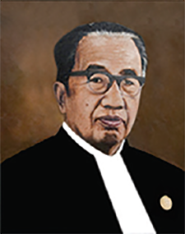
Wirjono Prodjodikoro was the head justice of the Indonesian Supreme Court from 1952 to 1966.

Dr. Sahardjo LL.B.,was a National Hero and Minister of Justice of Indonesia during the First,Second,and Third Working Cabinets.

Sulaiman Effendi Kusumah Atmaja was an Indonesian judge and national hero who served as the first chief justice of the Supreme Court of Indonesia from August 1945 until August 1952. He was born to a noble ethnic-Sundanese family in Purwakarta,and obtained a law diploma from the Rechtschool in 1913. In 1919,he worked as a court clerk in Bandung,before leaving that job to continue his legal education at Leiden University. After graduating from Leiden in 1922,he returned to the East Indies,and became a judge in Batavia and later Indramayu.

Adnan Buyung Nasution,also known as Adnan Bahrum Nasution was an Indonesian lawyer,advocate,and activist.
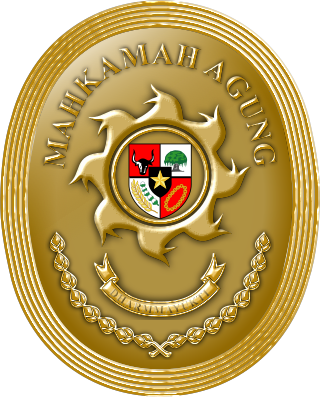
The Chief Justice of the Supreme Court of Indonesia is the head of the Supreme Court of Indonesia.
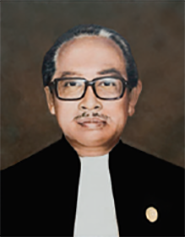
Subekti (1914-1992) was the fourth Chief Justice of the Supreme Court of Indonesia.

Mujono (1927–1984) was the sixth Chief Justice of the Supreme Court of Indonesia as well as the 16th Minister of Law and Human Rights. His appointment to both posts began a line of former military officials predominating in Indonesia's legal system.

Ali Said (1927-1996) was an Indonesian judge,military officer and politician. Like his predecessor Mujono,he was one of a string of former military officials to be appointed to the judiciary of Indonesia.
The Indonesian Judges Association,known locally as Ikatan Hakim Indonesia or IKAHI is an association of judicial officials in Indonesia. IKAHI's members include first-level trial judges and senior justices,as opposed to the Indonesian Judges' Forum (FDHI) which includes appeals court judges. IKAHI executive Suhadi has described the association's focus as protection of judges from threats and harassment,though judicial transparency activists have disputed this.

Purwoto Gandasubrata was the eighth Chief Justice of the Supreme Court of Indonesia. Alongside the Ministry of Justice officials in the Sixth Development Cabinet,Gandasubrata was a part of a general return of civilian officials to the judiciary of Indonesia in the early 1990s after a period of former military officials dominating the branch from the late 1970s. Gandasubrata had initially served as the chief of the district court of Semarang,as well as the chairman of the regional branch of the Indonesian Judges Association.

Suryono,also spelled Soerjono,was the ninth Chief Justice of the Supreme Court of Indonesia. The reputation of the Supreme Court among legal scholars suffered under his tenure due to Suryono's tendency to reverse seemingly final decisions via what were derisively termed "magic memos," and he was generally regarded as a candidate who would maintain the Supreme Court's subordination to the executive branch. He overturned an administrative court ruling that had lifted a New Order-era ban on Tempo,a popular political commentary magazine.
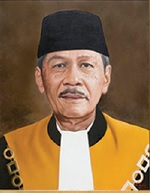
Sarwata was the tenth Chief Justice of the Supreme Court of Indonesia. Sarwata led an investigation by the Supreme Court into allegations of its own wrongdoing in 1996,during which his panel found no evidence of such wrongdoing. His promotion as Chief Justice thereafter was seen as a victory for the Court's old elite. He was the first Chief Justice of Indonesia to be openly accused of corruption.

Suryadi,alternatively spelled as Soerjadi,was an Indonesian politician who served as the chairman of the Indonesian Democratic Party from 1986 until 1998. He became prominent for his faction's involvement in the 27 July 1996 incident,or more commonly known as the Kudatuli incident.
Suryadi is a common Javanese name.

Hadisubeno Sosrowerdojo was the last chairman of the Partai Nasional Indonesia before its dissolution in the New Order. He also served as the Mayor of Semarang from 1951 until 1958,and the Governor of Central Java from 1958 until 1960. He was famous for publicly comparing Sukarno and Suharto and for challenging Suharto's rule during his early years.

Air Chief Marshal (Ret.) Elang Soerjadi Soerjadarma was the Commander of the Indonesian National Armed Forces from 1959 to 1962 and the Chief of Staff of the Indonesian Air Force from 1946 to 1962.
